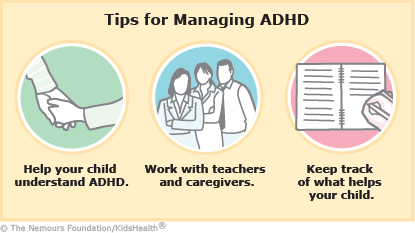- Parents Home
- Para Padres
- A to Z Dictionary
- Allergy Center
- Asthma
- Cancer
- Diabetes
- Diseases & Conditions
- Doctors & Hospitals
- Emotions & Behavior
- First Aid & Safety
- Flu (Influenza)
- Food Allergies
- General Health
- Growth & Development
- Heart Health & Conditions
- Homework Help Center
- Infections
- Newborn Care
- Nutrition & Fitness
- Play & Learn
- Pregnancy Center
- Preventing Premature Birth
- Q&A
- School & Family Life
- Sports Medicine
- Teens Home
- Para Adolescentes
- Asthma
- Be Your Best Self
- Body & Skin Care
- Cancer
- Diabetes
- Diseases & Conditions
- Drugs & Alcohol
- Flu (Influenza)
- Homework Help
- Infections
- Managing Your Weight
- Medical Care 101
- Mental Health
- Nutrition & Fitness
- Q&A
- Safety & First Aid
- School, Jobs, & Friends
- Sexual Health
- Sports Medicine
- Stress & Coping
A to Z: Attention Deficit Hyperactivity Disorder (ADHD)
May also be called: ADHD; Attention Deficit disorder; ADD
Attention deficit hyperactivity disorder (ADHD) is a common behavioral disorder that affects how well someone can sit still, focus, control impulses, and pay attention.
More to Know
At times, all kids (especially younger ones) have trouble sitting still, paying attention, or attending to details. The difference with ADHD is that these symptoms are present over a longer period of time and happen in different settings. They impair someone's ability to function socially, academically, and at home. Kids and teens with ADHD can have difficulty with impulse control and with staying focused, and may be hyperactive.
ADHD has biological origins that aren't yet clearly understood. No single cause has been identified, but researchers are exploring a number of possible genetic and environmental links.
There are three subtypes of ADHD:
- People with the inattentive type are easily distracted and have trouble listening and following directions.
- Kids with the hyperactive-impulsive type talk, run, and climb excessively, and have trouble sitting still, waiting in line, and playing quietly.
- The combined type involves aspects of the other two types and is the most common.
In most cases, all types of ADHD are best treated with a combination of medications and behavior therapy.

Keep in Mind
There's no cure for ADHD, but by working with a doctor and school staff to develop an individualized, long-term treatment plan, students with ADHD can learn to successfully live with and manage their symptoms. In some cases, the symptoms of ADHD may even become less severe as kids get older.
All A to Z dictionary entries are regularly reviewed by KidsHealth medical experts.